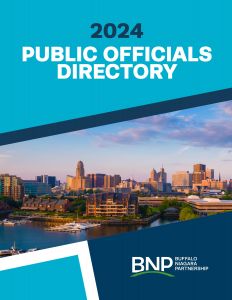
Effective advocacy is at the heart of what has made the Buffalo Niagara Partnership the premier employer organization in our region. Central to our advocacy efforts is our ongoing commitment to connect our members with local, state, and federal officials to champion the needs of local employers.
The BNP’s annual Public Officials Directory provides you with important contact information for the region’s government and economic development leaders. The information contained in this directory helps you work together with the BNP as we continue to push for legislative action and common-sense reforms necessary to keep Buffalo Niagara moving in the right direction.
– Grant Loomis, Senior Vice President
Public Officials Directory
The Public Officials Directory is provided as a benefit to Members of the Buffalo Niagara Partnership.

Members, please log in to the Member Portal to access this document.
Not a member? Contact lbenkovich@thepartnership.org.



